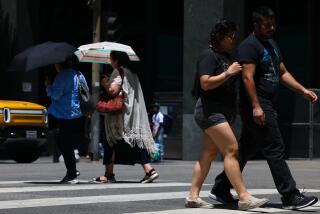California ends Ebola monitoring of travelers returning from West Africa
- Share via
The California Department of Public Health has announced that it no longer will monitor travelers returning from West Africa for symptoms of Ebola.
Citing an end to outbreaks of the disease in Liberia, Sierra Leone and Guinea, health officials said they were ending their Ebola monitoring program following consultation with the U.S. Centers for Disease Control and Prevention.
“With the three West African nations free of Ebola Virus Disease, daily monitoring of returning travelers will no longer be required due to the low possibility of transmission of the disease into the United States,” the health department said in a prepared statement Wednesday.
Join the conversation on Facebook >>
The monitoring program began Oct. 12, 2014, one day after a nurse at Texas Presbyterian Hospital in Dallas tested positive for the highly infectious disease.
The Texas nurse was one of two who contracted the disease after treating Thomas Duncan, a Liberian man who was visiting relatives in Dallas when he died of the disease. Duncan’s death and the nurses’ infection triggered a nationwide panic.
In California, roughly 1,300 travelers were monitored for signs of Ebola, each for a period of 21 days. No cases of Ebola were found in the state.
“Monitoring travelers from the affected countries was a monumental task that proved very successful,” California Department of Public Health director and State Public Health Officer Dr. Karen Smith said.
The West Africa Ebola outbreak started in December 2013 and infected 28,640 people, of whom 11,315 died. It has been the largest Ebola outbreak in history.
The World Health Organization has declared both Guinea and Sierra Leone Ebola-free, while Liberia is a week away from gaining similar status.
Interested in the stories shaping California? Sign up for the free Essential California newsletter >>
In addition to monitoring travelers, the state Department of Public Health worked with local departments and healthcare providers to ensure that emergency crews, physicians and hospitals were prepared and trained to deal with highly infectious disease such as Ebola.
“Continued focus on traveler health is extremely important,” Smith said. “We live in a world where the introduction of a new and highly infectious disease to California could be just a plane ride away.”
Twitter: @montemorin
ALSO
Los Angeles County outlines strategies to reduce homelessness
The sooner you turn in the federal student aid application, the better
Will new plans to end L.A. homelessness be fully funded?
More to Read
Sign up for Essential California
The most important California stories and recommendations in your inbox every morning.
You may occasionally receive promotional content from the Los Angeles Times.














